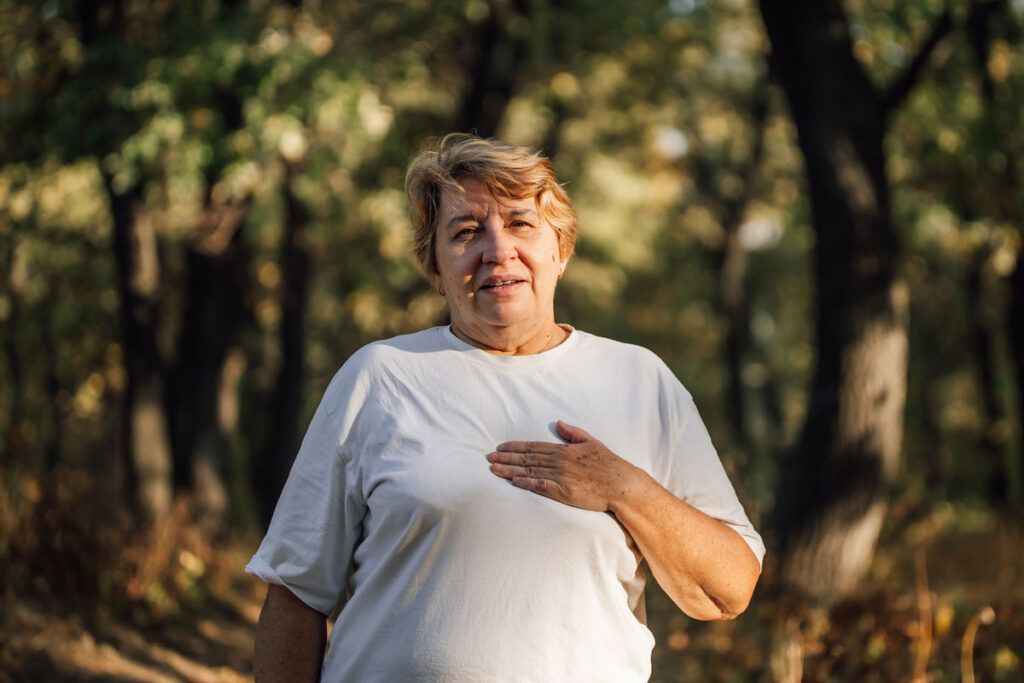Chronic obstructive pulmonary disease (COPD) comprises a group of lung and respiratory conditions that cause trouble breathing and damage to the lungs.
The most common COPD conditions are chronic bronchitis and emphysema.
COPD is a progressive disease that goes through different stages over the course of the illness.
It doesn’t have a cure, but the earlier you receive a diagnosis, the better you can manage it. And you can even slow its progression.
Early COPD symptoms

About 12.5 million people in the United States have COPD, and many don’t know they have it in its early stages, according to the American Lung Association.
Several factors can cause COPD — which is the third leading cause of death worldwide — such as smoking, exposure to secondhand smoke, infection, pollution, and genetics.
It’s a condition that doesn’t have a cure, but it’s preventable and treatable.
This is why there’s increased interest in learning about the early symptoms of COPD and how the disease develops.
The symptoms of early-stage COPD (also known as stage 1 COPD) resemble those of the common cold or the flu.
This contributes to people not knowing they have the condition. Still, the earlier you receive a diagnosis, the more manageable the condition is and the less damage the lungs go through.
Some early symptoms of COPD include:
- shortness of breath
- cough with phlegm that may bring up sputum (also called mucus or phlegm)
- chest tightness
- wheezing
- fatigue or tiredness
- recurrent lung infections, such as pneumonia and acute bronchitis
The disease will progress and symptoms can get worse if they’re not addressed promptly.
You may notice that you constantly cough or need to clear phlegm or mucus every day, or that you experience frequent colds, flu cases, or other respiratory infections.
If you experience any of these symptoms, consider talking with a healthcare professional.
When to contact a doctor
The American Lung Association says that millions of people with COPD in the United States don’t know they have it. This may be because the early signs of symptoms resemble those of the common cold or the flu.
But you should get help from a healthcare professional if you experience these symptoms long term.
Also, if you know you have some risk factors for COPD — like prolonged exposure to smoke over your life — or if you have a close family member with COPD, you might take note of these otherwise mild symptoms and get a diagnosis quickly.
A healthcare professional may have you do a breathing test and pulmonary function tests like spirometry and oscillometry that measure airflow and blockages in airflow to the lungs.
There’s no single test to help diagnose early COPD. A healthcare professional may perform these tests — along with a physical exam — and consider your personal health history.
COPD treatment
If you receive a diagnosis of early-stage COPD, treatment is mainly based on lifestyle strategies. Quitting smoking (if you smoke) is the primary and most important strategy. Other advice includes:
- avoiding secondhand smoke
- eating a balanced diet
- practicing regular physical activity
- keeping up with vaccines for the flu
- trying some breathing exercises
Medications and medical interventions are generally used in later stages of the disease. Some medications that a healthcare professional may prescribe you include:
- bronchodilators, such as albuterol (ProAir) and salmeterol (Advair)
- corticosteroids like prednisone (Prelone) and fluticasone (Flovent)
- antibiotics like amoxicillin (Amoxil) if you have a bacterial infection in your airway system
- beta-2 agonists like formoterol (Perforomist) and levalbuterol (Xopenex)
- expectorants like guaifenesin (Mucinex)
Depending on the stage and severity of your COPD, a healthcare professional may recommend oxygen therapy and surgery.
You may also consider pulmonary rehabilitation, which is a program that includes exercise and dietary plans as well as mental health support.
If you need help covering the cost of medications, the free Optum Perks Discount Card could help you save up to 80% on prescription drugs. Follow the links on drug names for savings on that medication, or search for a specific drug here.

Free prescription coupons
Seriously … free. Explore prices that beat the competition 70% of the time.
Get free cardSummary
Chronic obstructive pulmonary disease (COPD) is an umbrella term that encompasses several conditions that affect lung function and cause trouble breathing and lung damage.
Early COPD describes the very early stage of the disease. COPD doesn’t have a cure, but it’s preventable and treatable.
Knowing the early signs of COPD is key to the successful management of the condition and the prevention of the progression of symptoms.
Some early signs of COPD are very similar to those of the common cold and flu. This is why many people with the condition don’t know they have it.
Symptoms of early COPD are consistent coughing with phlegm, chest tightness, and wheezing. The symptoms can get worse and lead to fatigue and trouble breathing.
If you experience any of these symptoms and frequent colds and respiratory infections, talk with a healthcare professional. They can help determine whether your symptoms are a sign of early COPD or another respiratory condition.
Download the free Optum Perks Discount Card to save up to 80% on some prescription medications.
